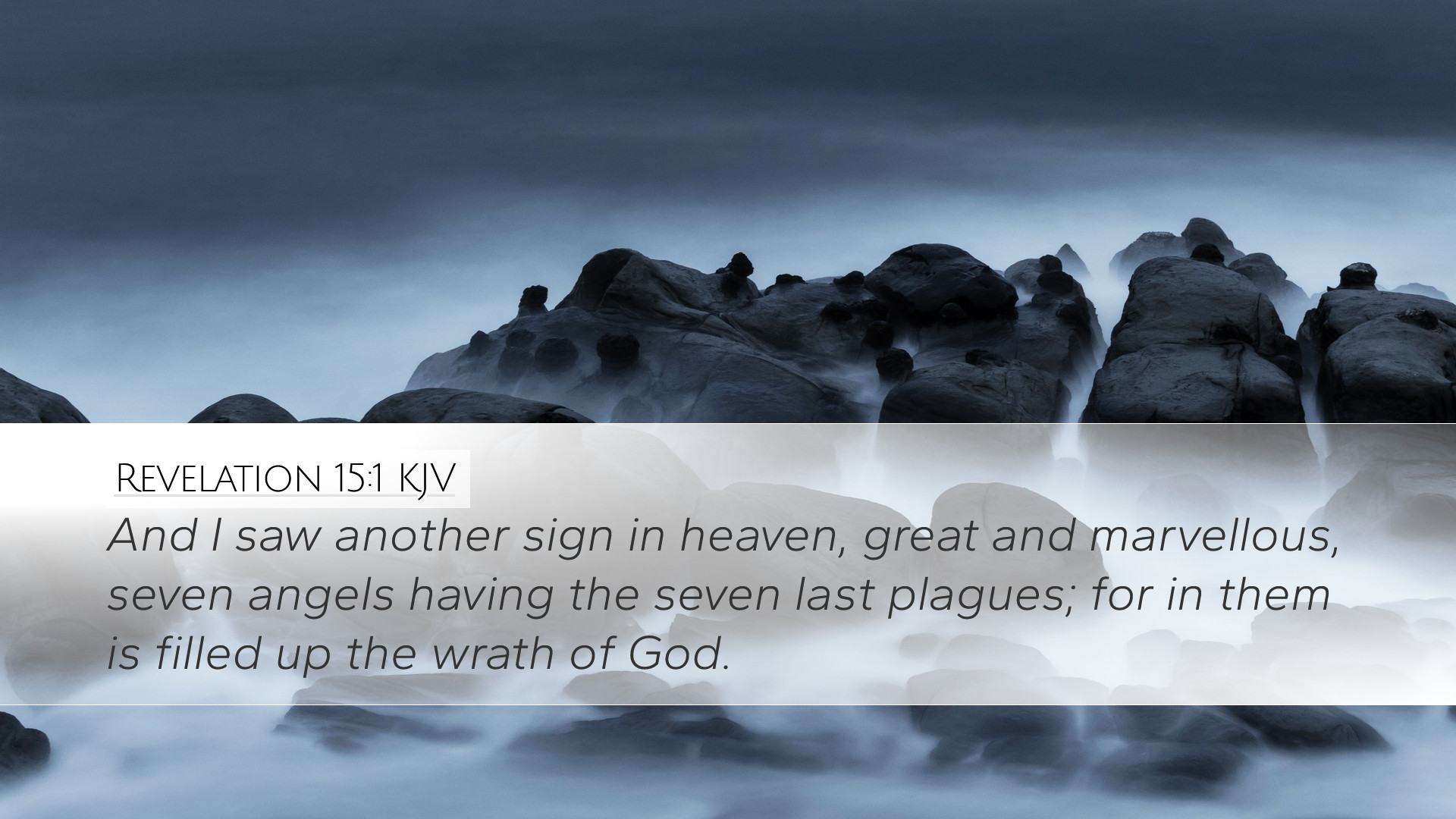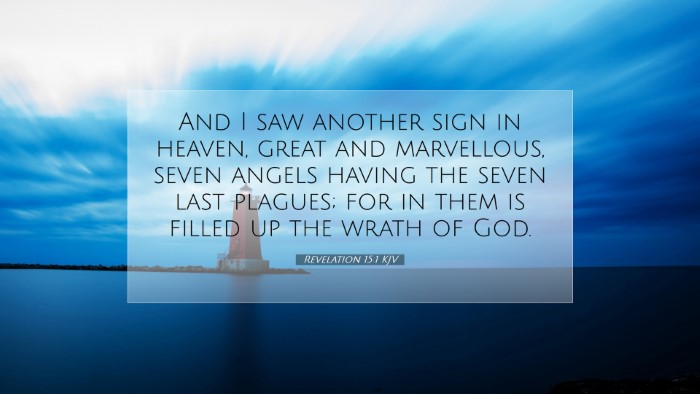Commentary on Revelation 15:1
Revelation 15:1 states: “And I saw another sign in heaven, great and marvelous, seven angels having the seven last plagues; for in them is filled up the wrath of God.”
This verse serves as a prelude to the final series of God’s judgments upon the earth. It opens a significant chapter within the apocalyptic framework of the Book of Revelation.
Overview of Revelation 15:1
The verse introduces a vital theme in the prophetic writings—divine wrath manifested through plagues. The term “sign” indicates that this event is more than mere observation; it is a calling for deep spiritual understanding and reflection among believers.
Insights from Matthew Henry
Significance of the 'Signs':
Matthew Henry notes that the “great and marvelous” sign encapsulates the severity and gravity of the coming judgments. It is essential to recognize that this sign serves as a divine revelation, demonstrating God’s sovereignty in orchestrating history towards a climactic conclusion.
Seven Angels and Last Plagues:
Henry further elucidates the importance of the seven angels with the seven plagues. He emphasizes that the number seven signifies completeness, indicating that these judgments are the final manifestations of God's wrath. The term "last plagues" is underscored as it infers that there is no further opportunity for repentance; the time for grace has ended.
Insights from Albert Barnes
The Wrath of God:
Albert Barnes elaborates on the concept of divine wrath, arguing that God’s judgments are not arbitrary but are a culmination of sin and rebellion against His holiness. The fact that these plagues “fill up” God’s wrath serves to highlight the seriousness of rejection of divine truth and the inevitability of divine justice.
Significance of Plagues:
Barnes explains that the allusion to plagues should remind readers of the historic plagues of Egypt, serving as a warning against the consequences of idolatry, disobedience, and hard-heartedness. He aligns the imagery with God's deliverance intertwined with judgment throughout biblical history.
Insights from Adam Clarke
Vision of Judgment:
Adam Clarke comments on the startling and breathtaking vision of angels. For Clarke, the use of “another sign” suggests that John consistently perceives deeper layers of revelation that accumulate and build upon prior visions, intensifying the portrayal of God’s plan.
Expectations for Believers:
Clarke warns that for believers, this revelation is double-edged; it is a reminder of both God’s impending judgment and the ultimate triumph of good over evil. He highlights the importance of maintaining faith and preparedness in light of the coming plagues, urging believers to remain steadfast.
Theological Themes in Revelation 15:1
-
Divine Sovereignty:
The appearance of the seven angels illustrates God's authority over history and His control over the final outcomes of the world.
-
Judgment and Justice:
The plagues serve a dual purpose—same as in ancient Egypt—displaying God's justice towards sinning humanity while simultaneously revealing His mercy through appeals to repentance.
-
Hope and Assurance for Believers:
This passage underscores the victory of the faithful over ongoing strife and the promise of redemption through Christ despite the present trials.
-
Call to Righteousness:
The warning of impending judgments urges humanity towards reflection and repentance, reinforcing the moral imperative for believers to live out their faith authentically.
Application for Pastoral Ministry
As pastors and leaders, it is crucial to communicate the seriousness of the coming judgments while coupling this message with the profound love and grace of God. This balance can lead to genuine repentance and a deeper understanding of God’s holiness and justice.
The significance of “signs” in the heavens can be viewed as encouragement to our congregations to examine their spiritual lives closely, fostering an environment conducive to confession, prayer, and worship. The narrative of God’s work throughout history invites believers into a relationship grounded in hope, calling them to active participation in His redemptive plan.
Conclusion
Revelation 15:1 encapsulates a pivotal moment in the theological arc of the Apocalypse. The combined insights of revered commentators Matthew Henry, Albert Barnes, and Adam Clarke provide a comprehensive framework within which to understand God's unfolding story of judgment, justice, and grace. The passage serves not only as a dire warning but also as a profound invitation to faithfulness for all who seek to dwell in the presence of the Almighty.


